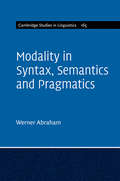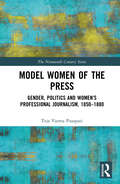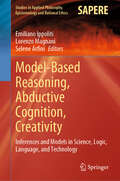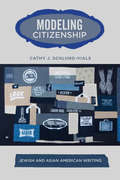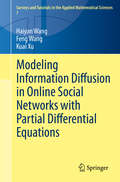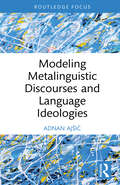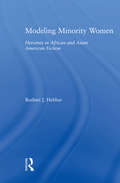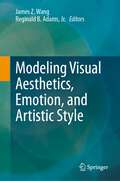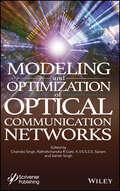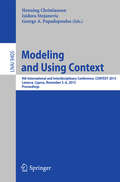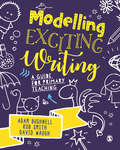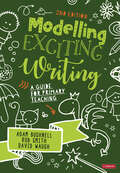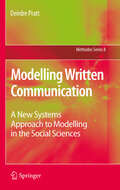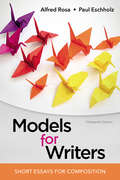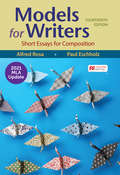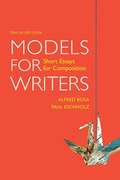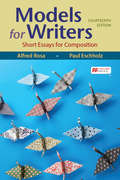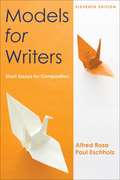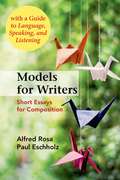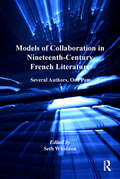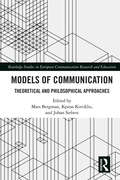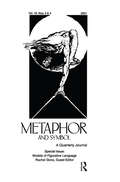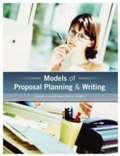- Table View
- List View
Modality in Syntax, Semantics and Pragmatics (Cambridge Studies in Linguistics #165)
by Werner AbrahamWhat do we mean when we say things like 'If only we knew what he was up to!' Clearly this is more than just a message, or a question to our addressee. We are expressing simultaneously that we don't know, and also that we wish to know. Several modes of encoding contribute to such modalities of expression: word order, subordinating subjunctions, sentences that are subordinated but nevertheless occur autonomously, and attitudinal discourse adverbs which, far beyond lexical adverbials of modality, allow the speaker and the listener to presuppose full agreement, partial agreement under presupposed conditions, or negotiation of common ground. This state of the art survey proposes a new model of modality, drawing on data from a variety of Germanic and Slavic languages to find out what is cross-linguistically universal about modality, and to argue that it is a constitutive part of human cognition.
Model Women of the Press: Gender, Politics and Women’s Professional Journalism, 1850–1880 (The Nineteenth Century Series)
by Teja Varma PusapatiThis book offers the first extended account of the mid-century rise of ‘model women of the press’: women who not only stormed the male bastions of social and political journalism but also presented themselves as upholders of the highest standards of professional journalistic practice. They broke the codes of anonymity in several ways, including signing articles in their own names and developing distinctly female personae. They proved, by example, women’s fitness for conventionally masculine lines of journalism. By placing Victorian women’s serious, high-minded journalism firmly within the context of ‘the widening sphere’ of female professions in mid-nineteenth-century England, the book shows how a wide range of women writers, including leading Victorian feminists and female reformers, contributed to the professionalization of women’s authorship. Drawing on extensive archival research and close analysis of a wide range of printed texts, from Victorian newspapers and periodicals to autobiographies, memoirs, and fiction, this book elucidates several aspects of Victorian women’s journalism that have been previously ignored: the market interest of the feminist English Woman’s Journal; the ability of women like Eliza Meteyard and Frances Power Cobbe to write consistently on serious social and political issues in mainstream periodicals; Harriet Ward’s astonishing reportage from the war fields of South Africa; and Harriet Martineau’s reports on Famine-devastated Ireland and her role as a transatlantic commentator on American abolitionism. The study also offers the first focused account of the figure of the female professional journalist in Victorian novels, showing how these texts move away from the dominant myth of the author as a solitary genius to present the female journalist as a collaborator who adapts her writing to fit various newspapers and periodicals, and works closely with male editors and peers. In examining the rise of the Victorian woman writer as a serious social and political journalist, this book adds to current critical understanding of female political expression, authorial agency, and cultural authority in nineteenth-century England.
Model-Based Reasoning, Abductive Cognition, Creativity: Inferences and Models in Science, Logic, Language, and Technology (Studies in Applied Philosophy, Epistemology and Rational Ethics #70)
by Emiliano Ippoliti Lorenzo Magnani Selene ArfiniThis book discusses how scientific and other types of cognition make use of models, abduction, and explanatory reasoning in order to produce important, innovative, and possibly creative changes in theories and concepts. Gathering revised contributions presented at the international conference on Model-Based Reasoning (MBR023), held on June 7–9, 2023 in Rome, Italy, the book addresses various intertwined topics ranging from the epistemology and applications of models also concerning the problem of knowledge production and scientific methodology (information visualization, experimental methods, and design) to the analysis of their role in cognition, decision-making, also with respect to social implications. The problem of model-based cognition is also illustrated taking advantage of recent results regarding problem-solving, abduction, and logic, paying attention to a critique of the dominant and received approaches, to the aim of fostering new discussions and stimulate new ideas. All in all, the book provides researchers and graduate students in the fields of applied philosophy, epistemology, cognitive science, and artificial intelligence alike with an authoritative snapshot of the latest theories and applications of model-based reasoning.
Modeling Citizenship: Jewish and Asian American Writing
by Cathy Schlund-VialsNavigating deftly among historical and literary readings, Cathy Schlund-Vials examines the analogous yet divergent experiences of Asian Americans and Jewish Americans in Modeling Citizenship. She investigates how these model minority groups are shaped by the shifting terrain of naturalization law and immigration policy, using the lens of naturalization, not assimilation, to underscore questions of nation-state affiliation and sense of belonging. Modeling Citizenship examines fiction, memoir, and drama to reflect on how the logic of naturalization has operated at discrete moments in the twentieth century. Each chapter focuses on two exemplary literary works. For example, Schlund-Vials shows how Mary Antin's Jewish-themed play The Promised Land is reworked into a more contemporary Chinese American context in Gish Jen's Mona in the Promised Land. In her compelling analysis, Schlund-Vials amplifies the structural, cultural, and historical significance of these works and the themes they address.
Modeling Information Diffusion in Online Social Networks with Partial Differential Equations (Surveys and Tutorials in the Applied Mathematical Sciences #7)
by Feng Wang Haiyan Wang Kuai XuThe book lies at the interface of mathematics, social media analysis, and data science. Its authors aim to introduce a new dynamic modeling approach to the use of partial differential equations for describing information diffusion over online social networks. The eigenvalues and eigenvectors of the Laplacian matrix for the underlying social network are used to find communities (clusters) of online users. Once these clusters are embedded in a Euclidean space, the mathematical models, which are reaction-diffusion equations, are developed based on intuitive social distances between clusters within the Euclidean space. The models are validated with data from major social media such as Twitter. In addition, mathematical analysis of these models is applied, revealing insights into information flow on social media. Two applications with geocoded Twitter data are included in the book: one describing the social movement in Twitter during the Egyptian revolution in 2011 and another predicting influenza prevalence. The new approach advocates a paradigm shift for modeling information diffusion in online social networks and lays the theoretical groundwork for many spatio-temporal modeling problems in the big-data era.
Modeling Metalinguistic Discourses and Language Ideologies (Routledge Focus on Applied Linguistics)
by Adnan AjšićThis volume offers a comprehensive treatment of corpus linguistic approaches to the study of metalinguistic discourses and language ideologies.The book traces the historical trajectories of research on language ideology and metalinguistic discourse, respectively, as a foundation for exploring both the opportunities and challenges of classic corpus linguistic approaches as applied to data sets from comparative South Slavic and English case studies. This analysis paves the way for exploring methodological innovations afforded by multivariate approaches, such as factor analysis, cluster analysis, and topic modelling by applying it to the same data sets. The book concludes by reflecting on challenges and lessons learned toward outlining future directions for the further development of research at the intersection of metalinguistic discourses and language ideologies.This book will be of interest to students and scholars in corpus linguistics, discourse analysis, sociolinguistics, and applied linguistics.
Modeling Minority Women: Heroines in African and Asian American Fiction (Studies in Asian Americans)
by Reshmi J. HebbarThis powerful study reconceptualizes ideas of ethnic literature while investigating the construction of ethnic heroines, shifting the focus away from cultural politics and considering instead narrative or poetic qualities which involve surprising relationships between Anglo-American women's writing and fiction produced by Asian American and African American women authors.
Modeling Visual Aesthetics, Emotion, and Artistic Style
by James Z. Wang Reginald B. Adams Jr.Modeling Visual Aesthetics, Emotion, and Artistic Style offers a comprehensive exploration of the increasingly significant topic of the complex interplay between human perception and digital technology. It embodies the cumulative knowledge and efforts of a wide array of active researchers and practitioners from diverse fields including computer vision, affective computing, robotics, psychology, data mining, machine learning, art history, and movement analysis. This volume seeks to address the profound and challenging research questions related to the computational modeling and analysis of visual aesthetics, emotions, and artistic style, vital components of the human experience that are increasingly relevant in our digitally connected world. The book's vast scope encompasses a broad range of topics. The initial chapters lay a strong foundation with background knowledge on emotion models and machine learning, which then transitions into exploring social visual perception in humans and its technological applications. Readers will uncover the psychological and neurological foundations of social and emotional perception from faces and bodies. Subsequent sections broaden this understanding to include technology's role in detecting discrete and subtle emotional expressions, examining facial neutrality, and including research contexts that involve children as well as adults. Furthermore, the book illuminates the dynamic intersection of art and technology, the language of photography, the relationship between breath-driven robotic performances and human dance, and the application of machine learning in analyzing artistic styles. This book sets itself apart with its unique multidisciplinary approach, encouraging collaboration across related domains. Packed with comprehensive tutorials, theoretical reviews, novel methodologies, empirical investigations, and comparative analyses, the book offers a rich combination of knowledge and methodologies. The book's focus on cutting-edge research not only presents the latest developments in the field but also illuminates potential paths that can lead to significant advancements in computer and robotic applications.
Modeling and Optimization of Optical Communication Networks
by Rathishchandra R. Gatti Chandra Singh Ashish Singh K.V.S.S.S.S. SairamMODELING and OPTIMIZATION of OPTICAL COMMUNICATION NETWORKS Optical networks are an integral part of many of the technologies that we use every day. It is a constantly changing and evolving area, with new materials, processes, and applications coming online almost daily. This book provides a basis for discussing open principles, methods and research problems in the modeling of optical communication networks. It also provides a systematic overview of the state-of-the-art research efforts and potential research directions dealing with optical communication metworks. It also simultaneously focuses on extending the limits of currently used systems encompassing optical and wireless domains and explores novel research on wireless and optical techniques and systems, describing practical implementation activities, results and issues. A handbook on applications for both academia and industry, this exciting new volume includes detailed discussions on real-world case studies on trends and emerging technologies associated with modeling of optical communication networks. This book also describes several numerical models and algorithms for simulation and optimization of optical communication networks. Modeling and optimization presents several opportunities for automating operations and introducing intelligent decision making in network planning and in dynamic control and management of network resources, including issues like connection establishment, self-configuration, and self-optimization, through prediction and estimation by utilizing present network state and historical data. It focuses on extending the limits of currently used systems encompassing optical and wireless domains, and explores the latest developments in applications like photonics, high speed communication systems and networks, visible light communication, nano-photonics, wireless, and MIMO systems.
Modeling and Using Context
by Henning Christiansen Isidora Stojanovic George A. PapadopoulosThis book constitutes the proceedings of the 9thInternational and Interdisciplinary Conference on Modeling and Using Context,CONTEXT 2015, held in Larnaca, Cyprus, in November 2015. The 33 full papers and 13 short papers presented werecarefully reviewed and selected from 91 submissions. The main theme of CONTEXT2015 was "Back to the roots", focusing on the importance ofinterdisciplinary cooperations and studies of the phenomenon. Context, contextmodeling and context comprehension are central topics in linguistics,philosophy, sociology, artificial intelligence, computer science, art, law,organizational sciences, cognitive science, psychology, etc. and are alsoessential for the effectiveness of modern, complex and distributed softwaresystems. CONTEXT 2015 embedded also a Doctoral Symposium, andthree workshops; Smart University 3. 0; CATI: Context Awareness and TactileDesign for Mobile Interaction; and SHAPES 3. 0: The Shape of Things.
Modelling Exciting Writing: A guide for primary teaching
by David Waugh Adam Bushnell Rob SmithIn order to teach writing effectively, teachers must be able to model writing effectively to children. The Primary National Curriculum sets challenging expectations for the teaching of writing. Children must master the process of composition, redrafting, editing and writing final pieces. Increased emphasis on spelling, punctuation and grammar may leave some teachers and trainee teachers lacking ideas for developing children's writing beyond transcription and into composition. It is important that they are able to demonstrate their knowledge and understanding, as well as the practical applications of both transcriptional and compositional aspects of writing.
Modelling Exciting Writing: A guide for primary teaching
by David Waugh Adam Bushnell Rob SmithIn order to teach writing effectively, teachers must be able to model writing effectively to children. The Primary National Curriculum sets challenging expectations for the teaching of writing. Children must master the process of composition, redrafting, editing and writing final pieces. Increased emphasis on spelling, punctuation and grammar may leave some teachers and trainee teachers lacking ideas for developing children's writing beyond transcription and into composition. It is important that they are able to demonstrate their knowledge and understanding, as well as the practical applications of both transcriptional and compositional aspects of writing.
Modelling Exciting Writing: A guide for primary teaching
by David Waugh Adam Bushnell Rob SmithThe Primary National Curriculum sets challenging expectations for the teaching of writing. Children must master the process of composition, redrafting, editing and writing final pieces. The book: *Provides practical advice for the teaching of writing *Demonstrates how to model writing for children *Includes examples of good classroom practice of modelling writing *Focuses on writing in different aspects of the curriculum *Provides guidance, case studies and theoretical perspectives to show readers how they can become writers with and for children The updated second edition includes: *Ideas for discussion in a seminar/staff meeting/CPD event *A new chapter enabling teachers to support children to bring their own cultures and ethnicities into their writing
Modelling Exciting Writing: A guide for primary teaching
by David Waugh Adam Bushnell Rob SmithThe Primary National Curriculum sets challenging expectations for the teaching of writing. Children must master the process of composition, redrafting, editing and writing final pieces. The book: *Provides practical advice for the teaching of writing *Demonstrates how to model writing for children *Includes examples of good classroom practice of modelling writing *Focuses on writing in different aspects of the curriculum *Provides guidance, case studies and theoretical perspectives to show readers how they can become writers with and for children The updated second edition includes: *Ideas for discussion in a seminar/staff meeting/CPD event *A new chapter enabling teachers to support children to bring their own cultures and ethnicities into their writing
Modelling Written Communication
by Deirdre PrattThis book offers an alternative view to current postmodern approaches to composition. It takes a critical realist stance to arrive at the "essence" of written communication with the aim of informing a practical application: a computerised writing tutor. Following Robert Franck's seminal work on modelling, a theoretical model of writing was first formulated, consisting of an architecture of functions which constitute the prerequisites for effective communication. Next, an applied model - a composing algorithm with an input option - was developed, showing composing to be a systemic social process with intra- and extra-systemic variation. The algorithm provided the design template for a writing tutor program which models for the learner both the systemic and the socially situated nature of writing. This book establishes composing as a communicative interaction, and shows the essential dynamism of writing, while offering an exemplar of a systems approach to modelling in the social sciences.
Models for Writers (Thirteenth Edition): Short Essays for Composition
by Paul Eschholz Alfred RosaModels for Writers is a best-selling book with a simple yet effective combination that has worked for thousands of instructors and millions of students: short, accessible essays and helpful, thorough writing instruction. Models continues to offer thought-provoking readings organized to demonstrate not only the rhetorical strategies that students will use in their own essays but also the elements and language that will make those essays effective--trustworthy coverage you won't find anywhere else. Also unique to Models is its versatility and flexibility: It works in a wide range of courses and at various levels. This edition offers new classroom activities for academic and professional writing that will get students to think critically about and practice the kinds of writing they will be doing in college and beyond. The new edition anticipates the needs of today's students with helpful strategies for developing a strong thesis statement, expanded coverage of logical fallacies, entirely new coverage of APA documentation, and online multimodal readings and tutorials on critical reading and other essential topics.
Models for Writers with 2021 MLA Update: Short Essays for Composition
by Paul Eschholz Alfred RosaThis ebook has been updated to provide you with the latest guidance on documenting sources in MLA style and follows the guidelines set forth in the MLA Handbook, 9th edition (April 2021).Models for Writers provides brief, compelling readings similar in length to the essays you’ll be assigned to write in college. Step-by-step advice for writing includes definition, compare and contrast, and more, with additional coverage of the elements of the essay, using sources, and research papers.
Models for Writers: Short Essays for Composition
by Paul Eschholz Alfred RosaIt’s a simple, best-selling combination that has worked for over 20 years — short, accessible essays and helpful, thorough writing instruction. Models for Writerscontinues to offer thought-provoking selections organized to demonstrate not only the rhetorical patterns that students will use in their own essays but also the elements and language that will make those essays effective.
Models for Writers: Short Essays for Composition
by Paul Eschholz Alfred RosaModels for Writers provides brief, compelling readings similar in length to the essays you’ll be assigned to write in college. Step-by-step advice for writing includes definition, compare and contrast, and more, with additional coverage of the elements of the essay, using sources, and research papers.
Models for Writers: Short Essays for Composition (11th Edition)
by Paul Eschholz Alfred RosaIt's a simple, best-selling combination that has worked for thousands of students -- short, accessible essays and helpful, thorough writing instruction. Models for Writers continues to offer thought-provoking selections organized to demonstrate not only the rhetorical patterns that students will use in their own essays but also the elements and language that will make those essays effective. This edition offers more coverage of the key elements of academic writing, including new strategies for writing a research paper and a section on writing a reflective essay. Read the preface.
Models for Writers: Short Essays for Composition (12th edition)
by Paul Eschholz Alfred RosaModels for Writers is designed to help you learn to write by providing you with a collection of model essays--that is, essays that are examples of good writing.
Models of Collaboration in Nineteenth-Century French Literature: Several Authors, One Pen
by Seth WhiddenContributing to the current lively discussion of collaboration in French letters, this collection raises fundamental questions about the limits and definition of authorship in the context of the nineteenth century's explosion of collaborative ventures. While the model of the stable single author that prevailed during the Romantic period dominates the beginning of the century, the authority of the speaking subject is increasingly in crisis through the century's political and social upheavals. Chapters consider the breakdown of authorial presence across different constructions of authorship, including the numerous cenacles of the Romantic period; collaborative ventures in poetry through the practice of the "Tombeaux" and as seen in the Album zutique; the interplay of text and image through illustrations for literary works; the collective ventures of literary journals; and multi-author prose works by authors such as the Goncourt brothers and Erckmann-Chatrian. Interdisciplinary in scope, these essays form a cohesive investigation of collaboration that extends beyond literature to include journalism and the relationships and tensions between literature and the arts. The volume will interest scholars of nineteenth-century French literature, and more generally, any scholar interested in what's at stake in redefining the role of the French author
Models of Communication: Theoretical and Philosophical Approaches (Routledge Studies in European Communication Research and Education)
by Mats Bergman K 281 Stas Kirtiklis Johan SiebersComplementing earlier efforts to scrutinize the uses of models in the field of media and communication studies, this volume reassesses old perspectives and delineates new theoretical options for communication inquiry. It is the first book to undertake a philosophical investigation of the significance of modelling in the study of the varying phenomena, processes, and practices of communication. By homing in on the manifestations and purposes of modelling in ordinary discourses on communication as well as in theoretical expositions, the essays collected in this book cast new light on the importance of models for communication inquiry. This volume challenges received view of communication models as mere diagrams and opens up new paths of conceptual inquiry in communication research.
Models of Figurative Language: A Special Double Issue of Metaphor and Symbol
by Taylor Francis GroupFirst published in 2001. Volume 16, Numbers 3&4. This special issue is an attempt to record the state of the art of psycholinguistics research into figurative language. There are quite a number of models addressing distinct issues and aiming to solve different problems—the mark of a maturing field. Indeed, not one theory is tailored to solve all the problems. Rather, each model, while aiming at generality, also recognizes its limitation. Despite specializing in different topics, most of the theories presented here have some things in common. For one, most of them dispense with the literal/ nonliteral divide, proposing, instead, models that are capable of handling literal as well as figurative language. Some models focus on the role primary meanings play in comprehension, others shed light on context effects, and some models seem to encompass both in terms of the accumulating effects of constraints (whether linguistic or contextual).
Models of Proposal Planning and Writing
by Jeremy T. Miner Lynn E. MinerGrantseeking has become an increasingly competitive process. Beginning grantwriters sometimes assemble a collection of facts and present that information to grantmakers, hoping to receive support. However, sponsors rarely award grant funding just because a grantseeker supports a specific cause or works for a specific organization. Grantseekers must persuade sponsors to invest in their projects and organization. Successful grantseekers know that persuasion, not information, attracts funding. Persuasive proposals present a seamless argument that stands the test of reason, addresses psychological concerns, and connects project ideas to the values of the sponsor.
